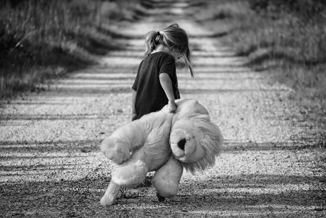 As an adult, there are inevitably seasons of life that seem harder to take
on in stride than others. In the face of hardship, anxiety, and the day-to-day
pressures of life, depression can seem like an inevitability that is destined
to sneak up at some point in life, whatever the causing factor and the
duration may be. While depression at any stage of life can be unspeakably
difficult, adults have the advantage of being able to internally-reflect,
self-identify, and pursue resources that can help. Children, on the other
hand, often-times do not possess this ability. It’s for this reason
that it’s incredibly important that parents know how to identify
depression in children, so that they can step up and help their little
ones identify the problem and get the help that they need.
As an adult, there are inevitably seasons of life that seem harder to take
on in stride than others. In the face of hardship, anxiety, and the day-to-day
pressures of life, depression can seem like an inevitability that is destined
to sneak up at some point in life, whatever the causing factor and the
duration may be. While depression at any stage of life can be unspeakably
difficult, adults have the advantage of being able to internally-reflect,
self-identify, and pursue resources that can help. Children, on the other
hand, often-times do not possess this ability. It’s for this reason
that it’s incredibly important that parents know how to identify
depression in children, so that they can step up and help their little
ones identify the problem and get the help that they need.
What to Look For
It's not uncommon for depression to go unseen or overlooked in children and teenagers because parents often chalk it up to puberty and natural mood swings that can accompany certain ages. While it will take some discernment on the parents’ part to make this determination, there are warning signs that you should keep an eye out for that could speak to a deeper struggle. Below are some signs to watch for:
- Lack of interest in hobbies and usual pastimes
- Withdrawal
- A change in appetite (can be either an increase or decrease)
- A change in sleeping patterns (overly tired or unable to sleep at night)
- Low energy
- Mood swings and irritability
- Giving away valued possessions
- A shift in school performance (skipping class, reduced participation, and/or lower grades)
- Feelings of hopelessness or worthlessness
What Could be Causing It
If you’re noticing your child is displaying signs similar to above, you should try and identify the cause of any depression or anxiety they’re struggling with. There are multiple different causes of depression in people of all ages—mental health is simply not a “one size fits all” diagnosis. Below are different causes of depression that may be contributing to your child’s struggle:
Personal Hardship & Grief- If there’s been a big change in your child’s life, they may be struggling with their sense of security as they try to come to terms with a perceived loss. This can range from the death of someone they cared about, to a friend moving away, to social hardships with peers. Divorce and shifting family dynamics can also play a huge roll in children feeling that their world is turned upside down. If this is the case, try to create a safe space in your home where your child can talk about their loss, their fears, and their future concerns.
Medication- If you child is on alternative medications, it’s possible that depression could be a side-effect. If so, you’ll want to speak with your child’s doctor about alternative medications available.
Biology- there are circumstances when depression can be a biological matter completely separate from circumstances. This is due to imbalances in certain neurotransmitters, such as serotonin, norepinephrine, and dopamine—chemicals that play a part in bodily functions, controlling sleep, eating, sexual behavior and mood. If this is the case, your child may benefit from certain anti-depressant medications, which should be discussed with a doctor.
How to Help
If you think your child is suffering from depression, try and pinpoint what the cause is, and create a game-plan on how you can help. Many times, affirming your child that you love them, they’re special, and helping them feel secure in themselves and their environment can help. Devoted time and attention from parents can go a long way, and you have insight and wisdom that can help them tune into a different and more positive perspective. It’s also important that, should your child open up to you, you acknowledge their inner-struggles and help create a safe space where they can share without having to fear getting in trouble.
 In addition to this, you can be proactive in ensuring that their health
and schedules are consistent. Take special care to feed your child healthy
meals that will fuel energy, encourage them to get to sleep at reasonable
hours that will allot them enough rest, and get them moving through quality
time spent outdoors. Whether that be a bike-ride in the park or family-walks
in the evening, a healthy and consistent schedule can certainly play a
part in counteracting feelings of depression.
In addition to this, you can be proactive in ensuring that their health
and schedules are consistent. Take special care to feed your child healthy
meals that will fuel energy, encourage them to get to sleep at reasonable
hours that will allot them enough rest, and get them moving through quality
time spent outdoors. Whether that be a bike-ride in the park or family-walks
in the evening, a healthy and consistent schedule can certainly play a
part in counteracting feelings of depression.
If you notice that symptoms are stretching on for weeks with no signs of improvement, a child therapist can be an invaluable resource. Sometimes having a third party to confide in that aren’t Mom or Dad can result in more open conversations. In addition to this, if a therapist senses that medication may be a necessary next step, they can help work with you to figure out what your options are.
A last note: if your child approaches you about their feelings of depression or anxiety, don’t ignore it. Children, and especially teenagers, are seeing higher percentages of suicide than ever before, so don’t let a cry for help go unheard. If your child is willing to vocalize their struggles, it’s imperative that you listen, dive deeper, and formulate a plan to help them address their concerns.
The team at Pacific Cascade Legal understands the importance of the family unit, as well as how important the prioritization of mental health for people of all ages can be. Depression is not a struggle that is exclusive to adults. Children and teenagers struggle with mental health disorders just the same, which is why it is so important that we, as parents, stay tuned-in to our children’s emotional well-beings.

